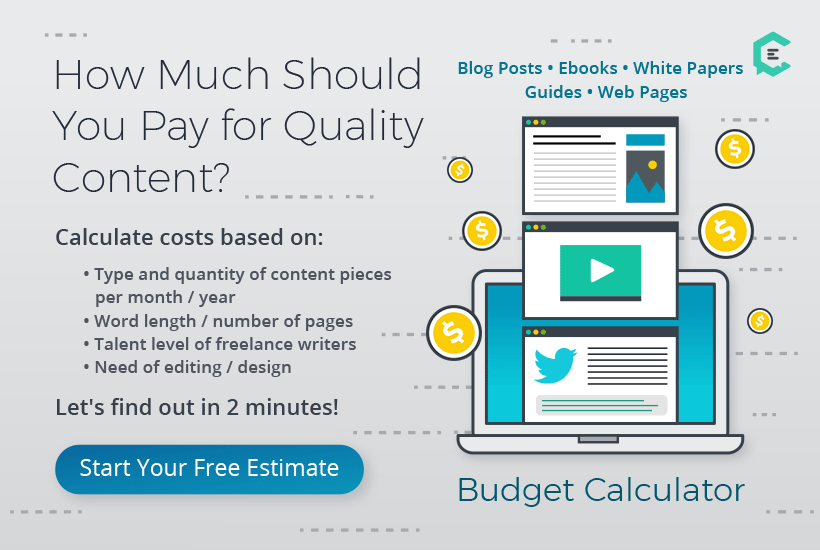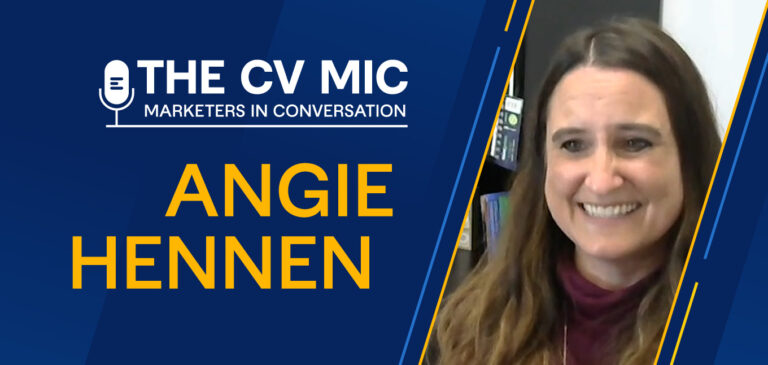Are there scenarios when you should pay a freelance writer more? The answer is yes. Not all projects are created equal. If the assignment requires an immediate turnaround, includes additional research, requires travel, demands multiple rounds of revisions, or includes tasks beyond writing, expect to pay more.
According to MarketingProfs’ 2017 Content Marketing Benchmarks, Budgets, & Trends study, 56% of companies lean on outsourced writers for their content marketing efforts. This year it’s more than ever before.
It’s no secret that businesses source talented and qualified freelancers to meet their content marketing needs. In addition to the economic benefits of outsourcing freelancers — like not having to pay for a full-time salary or benefits, workspace or technology — freelancers are a great solution for finding subject matter experts who are ideally suited to a specific writing project.
Freelance Writers Offer Value Beyond Words
Freelancer writers are quickly evolving to become increasingly vital to the workforce, presenting brands with a high level of expertise, professionalism, grit and tenure. They offer strategies to further improve what you’ve already established and can:
- Ensure that content is fact-based and credible.
- Prioritize delivering content quality versus quantity.
- Develop a different perspective, spotting problems and opportunities within your content ecosystem.
- Present an expert point of view, drawing from outside market knowledge.
- Deliver content on a timeframe that supports the need of your brand.
- Pitch new content ideas, speaking to the needs of your audience.
- Allow you to focus on more strategic efforts, like strategy, oversight or measurement.
- Improve a brand’s operations, allowing you to focus on what you do best.
- Further promote your brand’s content, with social influence.
How much should you pay freelance writers?
In 2016, ClearVoice polled dozens of freelance writers on their average rates (see our 2018 survey results). Here’s a recap of the findings:
Average Per Word Pay Rate
- 60% charge $0.10 – $0.19 per word
- 20% charge $0.20 – $0.35 per word
- 15% charge $0.50 – $1.00 per word
- 5% charge $0.35 – $0.50 per word
Average Per Project Pay Rate
- 40% charge $100 – $300 per project
- 28% charge $50 – $100 per project
- 12% charge $25 – $50 per project
- 12% charge $500+ per project
- 8% charge $300 – $500 per project
Average Per Hour Pay Rate
- 47% charge $35 – $50 per hour
- 32% charge $15 – $40 per hour
- 16% charge $50 – $100 per hour
- 5% charge $100+ per hour
While these prices run the gamut of freelance pay rates, it’s missing one thing: factoring in additional services or contingencies.
When should you expect to pay freelance writers higher rates?
The savviest freelancers know that each client, campaign or assignment is cut from different cloth — meaning standard rates don’t always apply. Brands should educate themselves on scenarios where they may have to pay a premium for certain efforts.
Justin McKinley, ClearVoice’s Director of Content, says, “Regardless of a writer’s savvy, always consider paying a writer a premium if you know the work requires more time and effort than usual, or is contingent upon special circumstances.”
Here are some instances where experienced freelance writers can charge a premium:
1. You suddenly need an assignment turned around in a few hours.
Have you asked a writer to turn around an assignment in 48 hours, but originally gave them a week? Many writers are willing to accommodate your tight deadline, but it’s nice to pay them for it. Often you should to expect to pay a “rush fee,” which could cost you 25%+ above a freelancer’s standard rate.
2. You change directions.
Organizational content priorities change, evolve or pivot on a regular basis. If your dispatched assignment needs to support the new organizational direction, and the writer has already drafted something, you still need to pay them for their time. Another scenario is if you dispatch an article with one concept in mind, but after mulling over the topic, you want to go a different direction.
3. The assignment requires a significant amount of research or grunt work.
You should expect to pay a higher rate if you require a freelancer to:
- Read and distill more than 2,000 words of information, complex in nature (ebooks, studies, case studies, webinars, presentations, annual reports, informational guides or long-form blog posts).
- Develop a corresponding data study to prove the validity of the content’s assertions or hypothesis.
- Extensively research a new product, idea or concept.
- Test a product or service.
4. You changed the project timeline.
Things change quickly, especially in the business world. If you need to move around the due dates associated with a project — like a first draft, revision or final review — it impacts a freelancer’s schedule. Most freelancers juggle multiple clients, so a schedule shift could affect their ability to complete projects for other clients. Be mindful of this scenario. If it happens, a freelancer might ask for more compensation.
5. You’ve got a bad case of “scope creep.”
So your freelancer’s assignment quickly transforms from a small animal to a beast. Perhaps your assignment began at 1,000 words, but due to complexity of the content you need more words to fully explain it; or, you didn’t take the time to offer clarity and detail in a campaign brief, assignment or concept given to the freelancer for direction.
In the project management world, “scope creep” refers to unchecked, uncontrolled changes in a project’s scope at any point after the project begins. It happens in the content world all the time. And when it does, don’t be surprised to pay more for it, especially if you want to protect your credibility. Don’t be a bait-and-switcher!!
6. You require interviews.
Are primary sources necessary? It takes time to find, vet, reach and interview the best individuals for a story. Unfortunately, not all writers understand the art and protocols of interviewing, so expect to pay extra for journalistic expertise. You also should consider paying an additional premium for a writer who will go the extra mile to land an exceptional interview (e.g., with a hard-to-reach expert or celebrity). Access will cost you more.
7. You want them to optimize the content for multiple channels.
Never assume a writer will provide SEO metadata (e.g., meta descriptions, alt image text), apply appropriate internal links (linking high value webpages on your website), or include post copy for different social channels, etc., unless you ask them. Although including optimization as part of your assignment guidelines is wise, be mindful of how much extra work your require in total. Ask for too much, and you’ll pay more.
8. You request multiple rounds of revisions.
Revisions take time. Even the best writer may have to make revisions to their work, especially if they’re new to your brand and guidelines. For a 600-word post, revisions take at least 15 minutes to make — and sometimes hours. If you request unreasonable or excessive rounds of changes, you should expect to pay extra.
9. You require creative assets.
Small bootstrapped companies have limited resources, and freelancers are often the go-to solution as the jacks of many creative trades. Some freelancers are skilled writers and designers. At a minimum, they could help with image selection, which can sometimes be a burdensome task for brands. Some freelancers can even create infographics, graphics or video to support a piece of content. If this is the case, pay them extra for it.
10. You want concepts pitched.
Pitching concepts takes time. A writer needs to research your editorial guidelines, review previously written copy, and gain a good understanding of your brand’s mission. In fact, it’s not unheard of for a writer to spend around 30 minutes on a pitch. Writer and editor Megan Krause said in a recent ClearVoice post, “To get the jobs that pay the big bucks, you have to sink some effort into it.” Don’t forget that, and if possible, factor in pitch time into a freelancer’s payment, especially if you had a lot of back-and-forth with the writer before dispatching the assignment.
11. You want them to promote content.
Once you hit “publish” you must develop a receptive audience for the content. If your writer has expertise in not only content creation, but amplification as well, factor that into the scope of the project. It’s always good to leverage an additional audience.
12. The writer must attend an event.
Have you hired a writer to cover a particular event, trade show, concert, rally, book reading or conference? Brands should cover the cost of the event, on top of the admission rate. Also consider meals eaten out and travel time. Factor all these elements into the freelancer’s rate. Most often, establishing a flat rate for the project beforehand works out best for both parties.
13. You need ghostwritten content.
Bylined content generates great exposure for writers, and many will charge you if you strip their name from their work. Many freelancers generate new business from their bylines, so they miss out on the opportunity for accolades and extra exposure if their byline is removed — and that comes at a premium.
Note that ghostwritten content is created with the purpose of giving someone else (usually a busy professional or executive) the byline and credit for the work. Ghostwriting isn’t just writing copy with no byline (like a product description or website copy, per se).
14. You’re hiring the writer for a one-time gig.
One-time assignments may come at a premium for some writers. Once a writer gets in a groove, understanding your brand’s nuances and preferences, products/services, and communication strategies becomes easier. With repeated projects, the writers can typically write content faster as they work on more and more content. So, if you propose ongoing, high-dollar amount work with your freelancer, you may get a discount. Freelancers love continuous income streams so they don’t have to keep pitching to new clients.
15. You hired a writer and an influencer.
Many different types of writers exist, including generalists, subject matter experts, or influencers. Tyler Kurbat, a content marketing manager at Lane Terralever, says he would pay a premium for “any sort of contractual amplification or syndication to ensure the content is shared within key markets.” Hiring an influencer often comes at a premium because they have a relevant, engaged and wide audience they can cast your content to.
Why should you pay the premium?
Don’t try to cut corners or find the discount freelancers. In fact, ClearVoice recently conducted two studies on freelancer rates in the travel and technology industries, both validating the commonly assumed correlation that higher paid writers produce higher quality content. Through the studies it was confirmed that higher wages attract more capable, reliable and high-quality freelance writers. In fact, both studies revealed top-tier writers were highly editable, followed editorial direction well, demonstrated a natural knowledge of the subject matter, had few grammatical or spelling errors, and properly attributed sources.
Long story short, if pay and quality are associated, don’t be afraid to pay for it.
How should you pay the premium?
A writer in a number of ways sets a premium. While the “add-on” service charge is typically is discussed during the initial brainstorming phase or during project kick-off, this is not always the case. If you are using a system like ClearVoice, the writers work within the platform to set a particular rate based on all added services. Premiums can be set as an added percentage, per extra activity performed, as a flat fee per additional service offered, or just factored into the overall fee projection.
It’s best to negotiate pricing with your freelancer from the get-go so you are not taken aback after they send you an invoice. But in some instances, a writer may contact to you after a request has been made for more work to justify billing you for a premium service performed. No matter the scenario, you should pay it. They are doing more work and you owe it to them.
Parting Words
At ClearVoice, we equally advocate for brands and writers. We think brands should be able to access the very best content producers for their given industry in one place and we ardently support the freelance workforce. We do this by offering tips on improving their skills, finding more clients, opening up a marketplace to connect with hiring brands, and clarifying industry writing rate averages. Stay tuned for our complementary article from the freelancer writer’s perspective shining light on why some assignments take more time — and demand higher pay rates — than others.











